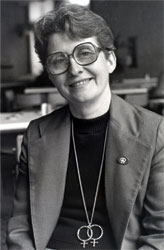Reader At Large
by Barbara Grier writing as “Gene Damon”
Photograph courtesy JEB[1]Barbara Grier image ©2017 by JEB (Joan E. Biren.) Used by permission.
Printed in the April 1966 issue of Tangents
pp. 24–27.
A fairly recent phenomenon is the male homosexual “evening waster” paperback. Ever since 1950, lesbian paperbacks have graced or disgraced the local newsstands. Now the men have a turn at the sweaty scramble between the sheets treatment. For those with time and a little money to spare, a trip to the local paperback outlet once every week or so is sure to turn up a few of the new all-male items such as: Diary of a Homosexual, by Anonymous (Imperial, 1965); Homo Alley, by Gregory Barnes (All Star, 1965); The Gay Bunch, by Lynton Wright Brent (Anchor, 1965); Sir Gay, also by Mr. Brent (Brentwood, 1965); Queer Hustler, by Joe Caruso (Neva, 1965); The Devil is Gay, by Frederick Colson (Brandon, 1965); Kept Boy, by Edward Culver (Rapture Books, 1964); Hom Sap, by Eric Du Val (Private Editions, 1965); The Gay Jungle and Mr. Muscle Boy, both by Donald Evans (Selbee Publ., 1965), etc…. I could continue to list these right through the alphabet of pseudonymous writers. No pretense of writing ability is attempted, though some show the slickness which comes from years of professional pulp writing. In any case, these do no harm and may, in fact, be very good for those too shy or too isolated to live their dreams. Many lives would be unbearable without some vicarious involvement with another, much different world.
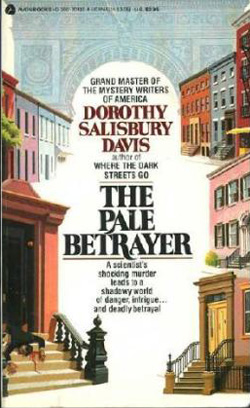 Along the same line, but written with far more obvious knowledge of the three paperback collections of Alexander Goodman’s short stories: The Soft Spot (1964), Carnal Matters (1965), and A Sliver of Flesh (1965), all published by Guild Press. The latest collection, A Sliver of Flesh, shows Mr. Goodman’s growth as a writer. It is very good.
Along the same line, but written with far more obvious knowledge of the three paperback collections of Alexander Goodman’s short stories: The Soft Spot (1964), Carnal Matters (1965), and A Sliver of Flesh (1965), all published by Guild Press. The latest collection, A Sliver of Flesh, shows Mr. Goodman’s growth as a writer. It is very good.
As has been increasingly noticed, every major author seems to have suddenly discovered homosexuality. Many no doubt made the scene before but kept their knowledge to themselves. Now even the more circumspect mystery novelists surprise us with books like The Pale Betrayer, by Dorothy Salisbury Davis (Scribner’s, 1965). This is a spy story (another “in” thing this year) which includes a male homosexual English professor (which is very “old hat”) .
Poor Oscar Wilde is yet again the subject of a book—but oh how he would have loved the attention in I Give You Oscar Wilde, by Desmond Hall (World, 1965). Enough said, really, just the hash and rehash of what everyone knows by now.
A rather sad and good portrait is included in The Train From Katanga by Wilbur Smith (Viking, 1965). Andre de Surrier, a homosexual, one of a white army of mercenaries attached to the Army of Katanga, is seriously brutalized and dies in a most exemplary manner.
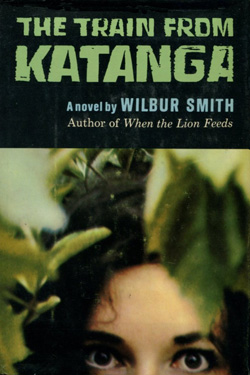 Those who write in the suspense genre seldom have space to develop characters fully, let alone provide psychological portraits. Desmond Cory, in his excellent novel, Deadfall (Walker, 1965), shows just how much depth and polish can be used in this field. The novel concerns a trio of jewel thieves, two men and a girl. The older man, Richard Noreau, is a homosexual, and the major action of the book is a grand diamond robbery. It is in the relationship between the tree protagonists that develop before, during, and after this robbery where Mr. Cory shines.
Those who write in the suspense genre seldom have space to develop characters fully, let alone provide psychological portraits. Desmond Cory, in his excellent novel, Deadfall (Walker, 1965), shows just how much depth and polish can be used in this field. The novel concerns a trio of jewel thieves, two men and a girl. The older man, Richard Noreau, is a homosexual, and the major action of the book is a grand diamond robbery. It is in the relationship between the tree protagonists that develop before, during, and after this robbery where Mr. Cory shines.
Politics, homosexuality, and unbelievable cruelty are the subjects of Joseph Breitbach’s Report on Bruno (Knopf, 1964). The life of the detestable Bruno Collignon is told by his grandfather who loves him not wisely and far too well—but still sees his essential evil. Bruno’s last tutor as he approaches adulthood (in a string of tutors found unsuitable for a variety of reasons) is Rysselgeert, a sympathetic, honorable and compassionate man who is, incidentally, a homosexual. Bruno’s grandfather is a political figure of importance in the unnamed country in which the novel is laid. All of the extremes of homosexual behavior are considered. Bruno is in love with Rysselgeert and expresses it in jealous hatred of him and his lover, Max. As Bruno grows up (chronologically at least), he becomes involved in politics and the day comes when he faces his grandfather on opposite sides of a bill which would lift restrictions on male homosexuals—faces his grandfather with symbolic blood on his hands since he has driven Rysselgeert and Max to a joint suicide. The portraits of Max and Rysselgeert more than make up for the deadly homoerotic Bruno—a literary villain of much stature.
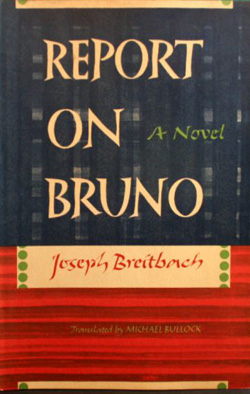 For a big junip, we to D. H. Lawrence, who is again receiving a great deal of critical attention in the “groves of academie.” Many studies of his work or portions of his work have been published in the last five years, and most libraries will have some of these. The scholars are beginning to discover the enormous amount of male homosexuality hidden in Lawrence’s writings. Most readers are familiar with his novels dealing with male homosexuals: Women In Love and Aaron’s Rod, as well as the stories: “The Prussian Officer” and “The Blind Man.” To these we can add two short stories, “The Shades of Spring” and “Jimmy and the Desperate Woman” and two novels, The White Peacock and The Plumed Serpent, all concerned to some extent with homoerotic relation- ships between men. He has, of course, two fairly famous lesbian entries as well as the short novel, The Fox, and the novel, The Rainbow.
For a big junip, we to D. H. Lawrence, who is again receiving a great deal of critical attention in the “groves of academie.” Many studies of his work or portions of his work have been published in the last five years, and most libraries will have some of these. The scholars are beginning to discover the enormous amount of male homosexuality hidden in Lawrence’s writings. Most readers are familiar with his novels dealing with male homosexuals: Women In Love and Aaron’s Rod, as well as the stories: “The Prussian Officer” and “The Blind Man.” To these we can add two short stories, “The Shades of Spring” and “Jimmy and the Desperate Woman” and two novels, The White Peacock and The Plumed Serpent, all concerned to some extent with homoerotic relation- ships between men. He has, of course, two fairly famous lesbian entries as well as the short novel, The Fox, and the novel, The Rainbow.
D. H. Lawrence is so widely anthologized that his stories are easy to obtain and his novels are to be found in most libraries. For these reasons I have excluded the bibliographic detail.
Trot is an army deserter, a sergeant wanted for murder, victim of a series of unfortunate incidents, and this novel by David Ely (Random, 1963; Signet, 1964) is an excellent combination of adventure and suspense. Thrown into an underworld racket in Paris (based on homosexual gimmicks) Trot runs for his life with the law, the army, and the reader in hot pursuit. By indirection this book points up the abuses possible only so long as homosexual behavior remains outside the law.
A Southern Gothic novel. The Mantis and the Moth, by Max Weatherley (Houghton, Mifflin, 1964; Pocket Books, 1965), contains an exceedingly graphic homosexual gang rape (all of the football squad assault the novel’s young hero) of no importance in the plot. This is a nice simple horror story, guaranteed to turn your hair white.
Also Southern, but this time gentle and satiric, is Clyde Miller’s The Summer Dancers (Macmillan, 1961). Lots of those subtle, yet screaming, portraits of the arty set. Very well-written novel, but not unless you can laugh at yourself a little.
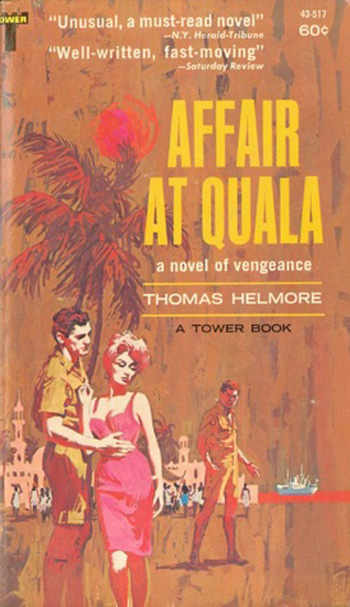 For easy to imagine reasons, female authors are sometimes kinder to male homosexuality than to lesbianism. Rosemary Manning’s The Shape of Innocence (London, Cape, 1961 and Garden City, NY; Doubleday, 1961) is an excellent study of the effects of the death of a male homosexual school teacher on the narrow-minded population of a small English village. This same author’s The Chinese Garden (London, Jonathan Cape, 1962 and NY; Farrar, Straus, 1963) is set in a very spartan English girl’s school and revolves on the destruction of a girl caught in a lesbian act with another student. Ridiculously, the entire staff of the school is, to some extent, homosexual, yet the girl is virtually pilloried. The difference in tone between the two novels makes it difficult to believe the same woman wrote both of them.
For easy to imagine reasons, female authors are sometimes kinder to male homosexuality than to lesbianism. Rosemary Manning’s The Shape of Innocence (London, Cape, 1961 and Garden City, NY; Doubleday, 1961) is an excellent study of the effects of the death of a male homosexual school teacher on the narrow-minded population of a small English village. This same author’s The Chinese Garden (London, Jonathan Cape, 1962 and NY; Farrar, Straus, 1963) is set in a very spartan English girl’s school and revolves on the destruction of a girl caught in a lesbian act with another student. Ridiculously, the entire staff of the school is, to some extent, homosexual, yet the girl is virtually pilloried. The difference in tone between the two novels makes it difficult to believe the same woman wrote both of them.
Thwarted love easily becomes hate, and Thomas Helmore’s Affair at Quala (Simon and Schuster, 1964; Tower, 1965) uses this age old theme combined with suspense as one man pursues another literally around the world to a final fatal meeting. Superior suspense novel—particularly in character development.
As Lincoln’s doctor’s dog is supposed to be to the proverbial reader, so the literary mystery is to me. The Terrible Door, by George Sims (Horizon Press, 1964), is about rare book dealer Robert Seldon and his search for the notorious “Ibiza Letters” written by a dead literary giant to his male lover. Seldon’s search takes him through all of the by-roads of a well-plotted mystery and into some of life’s darker closets to a most ironic ending, which will break the heart of every book lover. The knowing reader will recognize the famous writer on whom this book is clearly based.
The Beautiful Greed, by David Madden (Random House, 1961), is another one of those extremely subtle novels which could not be considered homosexual on expository levels but nevertheless contain much homoerotic content. It is about the world of commercial shipping—a life peculiarly suited to attract some types of homosexuals—and a life which might temporarily alter the sexual direction of men usually heterosexual. As an all-male novel (in the sense usually intended by reviewers) it is a failure; for the virility here is clan-directed and the women are sticks of wood.
Things as They Are, by Paul Horgan (Farrar, Straus, 1964), is a loosely connected series of childhood anecdotes, including that overdone theme of “older man makes pass at young boy” in the chapter entitled “Center of Interest.” Nothing special.
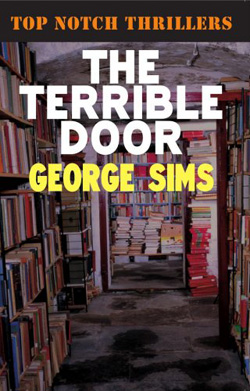 It’s worth the effort to locate a second hand copy of the November, 1965 issue of Fantasy and Science Fiction magazine for the literate and literary homosexual short story, “A Few Kindred Spirits,” by John Christopher.
It’s worth the effort to locate a second hand copy of the November, 1965 issue of Fantasy and Science Fiction magazine for the literate and literary homosexual short story, “A Few Kindred Spirits,” by John Christopher.
Gwyn Griffin, already known for his novels The Master of This Vessel and A Significant Experience (both of interest in this column), included a subtle and quite moving short story, “To Live In Peace,” in his collection, Scorpion on a Stone (Holt, Rinehart and Winston, 1965). Ostensibly a war story, it is in reality an all-male love story.
Olivia Manning’s story, “A Romantic Hero,” in Winter’s Tales 10, ed. by A. D. Maclean (London, Macmillan and NY, St. Martin’s Press, 1964, 1965), is the gentle but ironic tale of a shy homosexual who settles for a girl after being turned down by the boy he loves.
The Road To Hell, by Hubert Monteilhet (NY, Simon and Schuster, 1964, and London, Chapman and All, 1965), is paved with very had intentions. The citizens of a small French village, including a male homosexual teacher and a pair of lesbians, are variously forced to suffer unique punishments for their “sins.” A semi-mystery, fun and games really, with good literary allusions.
There is always an audience for the romantic treatments, and they are becoming harder to find. Paris, city of love and laughter (and a few other items), will be a kind of emotional “Mecca” forever, surely—at least if our writers continue to have their say. John Breon’s 1955 novel, The Sorrows of Travel (Putnam), tells of the Paris after the dark days of World War II were forgotten, and the “new group” of American expatriates who came to love and live and work in the circular streets. There is Paul, a musician of fire and splendor; Chuck, his one-legged roommate; Livia, the mysterious girl who cannot shake off the memory of the abortive former lover, Lucien; George, the misfit who loves Livia; and Albert, the villainous catalyst. Sadly, Albert is a vicious male homosexual—so undesirable he nauseates the reader as he spreads malicious havoc among the group. But the love between Chuck and Paul is the focal point of the novel. That it is tragic is no deterrent and as Paul holds the chilling hand of the dying Chuck and keens his love for him, the silent tears come easily to the reader. A very beautiful book, oddly seldom mentioned, yet much more major than many very popular titles.
Lastly, some may have missed the fact that Roger Peyrefitte’s fine novel, The Exile of Capri, published in London by Secker and Warburg in 1961, has finally been issued in a U.S. edition by Fleet in late 1965. Fans of Peyrefitte will want to run down the earlier novels, The Knights of Malta (Criterion, 1959) and The Keys of St. Peter (Criterion, 1960) which have been more or less overlooked and which contain substantial homosexual content, much of it historical interest.
—GENE DAMON
Content ©1966, 2016 by The Tangent Group. All rights are reserved.

